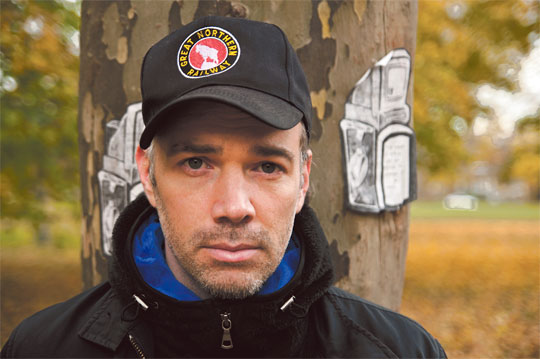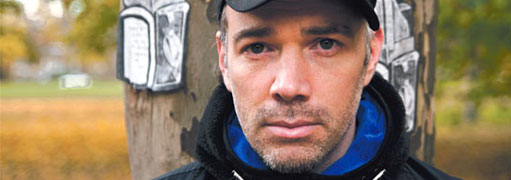Buck 65 has created hip-hop music under the mainstream radar for more than two decades. Originally from Mount Uniacke, Nova Scotia, he taught himself to rap and DJ, then started recording in his bedroom. He’s earned a reputation for disregarding genre limitations. Buck 65, whose given name is Richard Terfry, raps over violins, collaborates with female vocalists in French, makes whole verses by cutting in single-word samples with turntables and does pretty much anything else he wants to. His new album, 20 Odd Years , is a tribute and testament to his life in music so far. Its 12 tracks, many of which were co-written and recorded with different collaborators, have snappy beats and smart lyrics. They also have lovely melodies, nods to multiple styles and equal parts of melancholy reflection and playful quirkiness. The Alibi called Terfry at his home in Toronto, during a few days off in the middle of his tour. Do you fly home whenever possible? Well, yeah, I do often and there’s two main reasons for that. One is that I’m a married man now. But two is that I have a job. I’ve got this radio show [ “Radio 2 Drive” on CBC] that I do, and so usually, you know, my swift returns home are due to the demands of the management at my work. Why did you take that job? I don’t really know. When they first asked me, offered the job to me, I said no, actually. And then they kept asking and I kept saying no for a while. I talked it over with my wife and I talked it over with my manager and you know, finally my manager pointed out to me, You could just give two weeks’ notice at any time if you’re not happy with the way it’s working out.That was like an epiphany because I couldn’t really appreciate how regular jobs work. I had the idea that if I did this I’d be stuck in it forever, and I was really nervous and hesitant to do that. And then when that was pointed out I was like, Oh right, yeah, OK, so I guess there’s no harm in just trying it then. …There’s something about having a paycheck show up every two weeks, no matter what happens. Just like, there it is. I mean there’s so many ups and downs with the music business you never really know what your income is going to be like, for example.The interesting consequence of that—that I hadn’t considered when I agreed to take it on—is that it really had a profound effect on me, creatively. Because without being fully conscious of it at first, what I’m realizing now, looking back, is that it kind of took the pressure off. I feel like I’ve been more creative since I’ve taken this job than I ever have been. Did it allow you to take more risks in your music? Right, exactly. I would say that the first thing that I did after I took on this job is I really quickly made three albums that I put on the Internet; and part of the thinking behind that is that it probably would’ve been way too risky to try to release those same albums through my label. Not only for me. My label probably wouldn’t have touched them with a 10-foot pole, anyway. So I basically went to work on a very self-indulgent project, and that felt really good to do, actually. Which project are you referring to? It was this three-album project called Dirtbike. I wasn’t really thinking purely in terms of self-indulgence or purely in terms of how the crowd might react to it or anything. I just had this vague notion that I wanted to work on a project that was failure-proof. And the way that I determined that it could be failure-proof would be if I didn’t sell it—like if I made a pact with myself in the beginning that this would be a project that I wouldn’t even try to sell. And in fact I wouldn’t seek approval for it in any way, meaning I also wouldn’t send it to the press or get a publicist to work on it or anything like that. Because if you do anything and you’re really excited about it, and then you try to sell it and it doesn’t sell, then often our reaction is to say, Oh, I guess it was a failure then. Isn’t it inherent in artists to judge themselves by what others think? Yeah, you can’t help it. You can tell yourself you don’t, but you do. … If you believe in astrology at all, one of the things you learn is that, Oh you’re an artistic type which means you’re also very sensitive. You know that’s what everyone says, artists are very sensitive. That’s probably true, for me anyway, and I think it’s probably true for everybody. I embarked on this project with those two rules laid out for myself and, as a weird consequence of that, it became very self-indulgent and there was no real second-guessing involved. … It felt 100 percent positive. I think what gave me the idea in the first place is that’s how I used to work. Before I ever signed a deal, when I was just starting out, I would do these projects in my bedroom with no expectations of anybody ever hearing it. I remembered how much joy that gave me to make music in that way. And I began to feel desperate to just get back to feeling that way again. Is that how you created 20 Odd Years ? Yeah, I’d say that was the case, because I learned a huge lesson from making those Dirtbike records, which was: Let it feel good. … Having learned that I’ll never go back. 20 Odd Years is pretty melancholy. Is it a good indicator of what’s going on with you? Well, I mean, maybe. I might be a bit that way by nature, whether I like it or not. But what was really motivating me with this record, like most things I do, is that I just want to make stuff that’s beautiful. And I have this tendency … to see beauty in things that are a little more melancholy. To me that’s more beautiful than something that’s just kind of happy and positive. I guess in my mind it lacks some sort of complexity or something, and maybe things need to be a little bit complicated for it to be beautiful for me. And so that’s what I’m striving for. Plus, to be honest with you, it’s only in retrospect or in moments like these when I’m having conversations with somebody like you that I do look back on it and think, Yeah that’s kind of a radical thing to do with hip-hop. I mean, who else do you hear talking about like, Oh yeah, I want to make beautiful hip-hop music? That doesn’t seem to be a concern for anybody out there. So I think, OK, that’ll be my thing then, that’ll be my territory. I’m just trying to make pretty hip-hop songs. Your music is especially poetic for hip-hop. Do you read a lot? I do read a lot. And I think I read a fair amount of poetry. Since the time I was a kid I’ve been a pretty word-oriented person. … I’ve just sort of figured out an effective way that I can use words to make my life a little bit easier. I could write a book on trying to explain to you who my friend John Southworth is—that I wrote the song “BCC” with—but somehow in my mind if I say, Yeah, he showed up in a hot air balloon, that just kind of says it all. And immediately that’s going to, hopefully anyway, invoke somebody’s imagination. And I’ll just let those words do to someone else’s imagination what his did to mine. I just find it a little bit easier that way. It’s something I’ve learned over the years: making some effort to apply a bit of economy to your use of words, where it’s like, How can I try to capture something—at times something really grand like the concept of a person—how can I try to capture that in a couple words? And so I work on that. Your manager said Albuquerque is one of your favorite places to play. It’s true. Before [ 20 Odd Years ] came out, I released an EP called “Albuquerque” for that very reason. Mostly because I just had one of the best shows and nights of my life playing there … but then my next couple times in the states I ended up not passing through Albuquerque for reasons beyond my control, even though I wanted to. So I really wanted to let anybody there know that I was thinking about them. So I thought, Yeah, that’s what I’m going to call this EP. I want people to know that Albuquerque’s on my mind.
THIS SHOW HAS BEEN CANCELEDBuck 65with Sole and the Skyrider Band, Wake Self, and DJ Young NativeTuesday, Aug. 9, 8:30 p.m.Launchpad618 Central SWTickets: $12, all-ageslaunchpadrocks.combuck65.com











